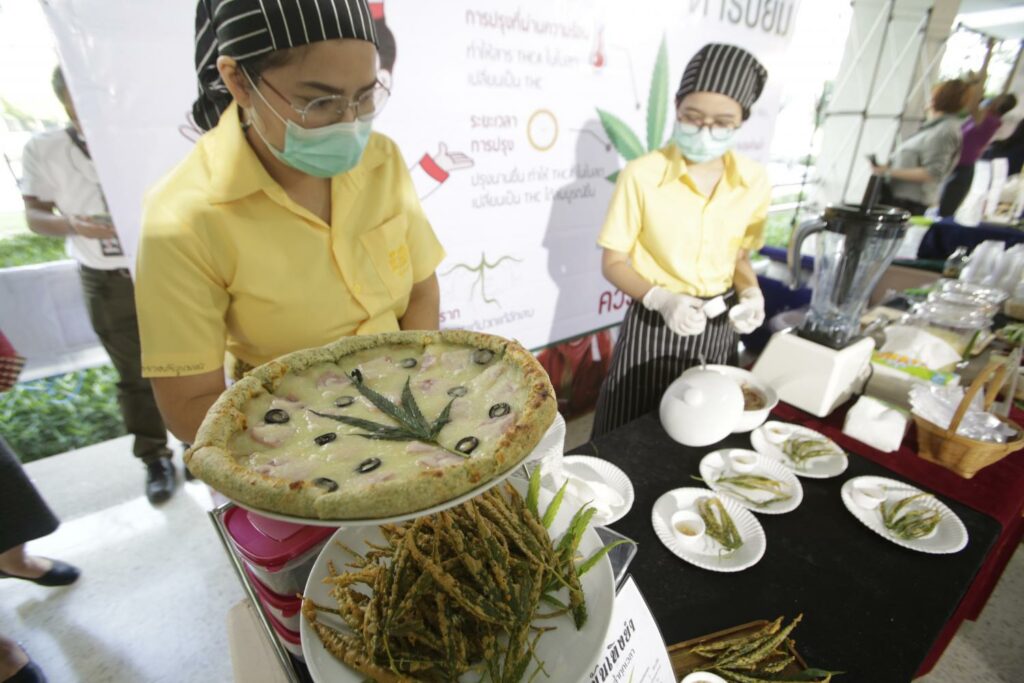Stoners Rejoice As Thailand Plans To Make Cannabis A Part Of The Mainstream
4 min read
Thailand became the first country in Southeast Asia to legalize medical marijuana in 2018. Use for recreational purposes is still prohibited. In Thailand, cannabis was used for traditional medicinal purposes. The herb was legal until the 1930s and was widely used in traditional Thai medicine. Unfortunately, due to international pressure, Thailand began banning the use of cannabis and introduced some of its first anti-drug laws.
The Narcotics Act
Almost 90 years later, cannabis is legal in Thailand, but only for medicinal purposes. In 2019, the Thailand Narcotics Act was amended to allow the use of cannabis for medical and research purposes.
Recently, Thailand allowed the use of cannabis for research purposes, as well as the cultivation and processing of the plant. Although recreational use of cannabis is still considered illegal.
All flowers and seeds obtained from the harvest grown at home must be sent to government medical facilities as they remain in the country’s criminal code due to their high levels of psychoactive compounds. The rest of the marijuana, including leaves, twigs, and fiber, as well as hemp plants, have been decriminalized and allowed to use in food and cosmetic products since last December.
Possession and use of the herb are only permitted if an appropriate license or doctor’s prescription is available. Some areas of government have access to the facility, as well as medical patients, farmers, and others who have been granted regulatory approval.
Cannabis, also known as marijuana, is a psychoactive drug
Recreational use and unlicensed possession can result in prison sentences and other additional penalties. Since cannabis was legalized for medicinal purposes, the number of illegal recreational users has skyrocketed due to easier access to the plant. Although cannabis medicines are officially only available for mandatory patents, they became readily available to teenagers after cannabis was legalized for medicinal purposes.
Now Thai households can grow six pots of cannabis to supplement their incomes, the country’s health minister said when the first country in the eastern region to legalize medical marijuana further simplified rules to encourage the commercial use of the crop.
Read More: Should Marijuana Be Legalized In India? Our bloggers argue
Families could come together and form communities to grow marijuana and deliver the harvest to public hospitals and government facilities, or to use it to produce food and cosmetic products as a new source of income, Thailand Deputy Prime Minister and Health Minister Anutin Charnvirakul added in a statement Friday.
Can we export or import weeds?
With a few exceptions, the import and export of cannabis products is currently not permitted. The government approved growers can import cannabis seeds from the Netherlands, and tourists can import their own medical supplies of cannabis. Tourists receiving cannabis therapy must apply for a special import permit and show their medical prescription.
The import of cannabis is illegal, although a certain part that comes from legal production and falls under Narcotics Plan 5 can be imported under certain circumstances. However, the importation of bark, trunk, fiber, twigs or other parts of cannabis specified in the announcement remains illegal unless a specific license is obtained from the government.
Thailand does not currently export any weed or cannabis products as supplies are currently scarce. However, several countries in the region have expressed an interest in high quality medical cannabis. Hopefully Thailand will start legalizing weed exports soon.
Since January 29, people interested in the manufacture, sale or possession of cannabis and hemp can register for certain parts of plants that are to be removed from the Type 5 narcotics list. A variety of hearty dishes, including pizza, kaprao, and khao yum, and drinks, can be prepared with cannabis as an ingredient.
Recreational use and unlicensed possession are still illegal in Thailand
Individuals, legal entities, government agencies, municipal corporations and corporations will be able to register starting January 29th to use the legal parts of cannabis and hemp for medicinal purposes, as well as in the textile, pharmaceutical and cosmetic industries. This is part of the government’s policy of promoting hemp and cannabis as a new cash crop. In Bangkok, registration applications will be received by the FDA office, while in other provinces, each application will be received and processed by the provincial health departments.
Pakakrong Kwankhao, a traditional medicine expert, recommended that six groups of people should avoid consuming food or drinks containing marijuana. These are people with liver or kidney problems, patients with heart disease, people under the age of 25, pregnant women, nursing mothers, and people who take drugs that have stimulatory effects.
Regardless of the ill effects, there are roughly a thousand benefits we can get from marijuana. Therefore, all other nations should soon follow in Thailand’s footsteps and legalize the use of marijuana at least for medical purposes and, if possible, bring it into the mainstream.
But since I’m a teenager myself, I won’t trust myself with unregulated legalization of weeds. Hence, regulated legalization is definitely a wise choice, especially for an overpopulated nation like India.
Image source: Google Images
Sources: Daily Marijuana Observer, Times of India, Siam Legal International
Find the blogger: @GhoshSohinee
This post is tagged under: Thailand, adolescents, benefits we get from marijuana, India, medicinal uses, Pakakrong Kwankhao, an expert in traditional medicine, liver or kidney problems, patients with heart disease, people under 25, pregnant women, breast Feeding the mother, textile, pharmaceutical and cosmetic industries, individuals, legal entities, government agencies, joint ventures, corporations, FDA, savory dishes, pizza, kaprao and khao yum and beverages, cannabis as an ingredient, unregulated weed legalization, weed export or cannabis products, import of cannabis is illegal, bark, stem, fiber, branch, Thailand’s Deputy Prime Minister and Minister of Health Anutin Charnvirakul, public hospitals, government facilities, recreational use, unlicensed possession, Southeast Asia, Thailand Narcotics Act
Other recommendations:
Here’s why marijuana legalization in India would be a stupid move








 Protected by Patchstack
Protected by Patchstack